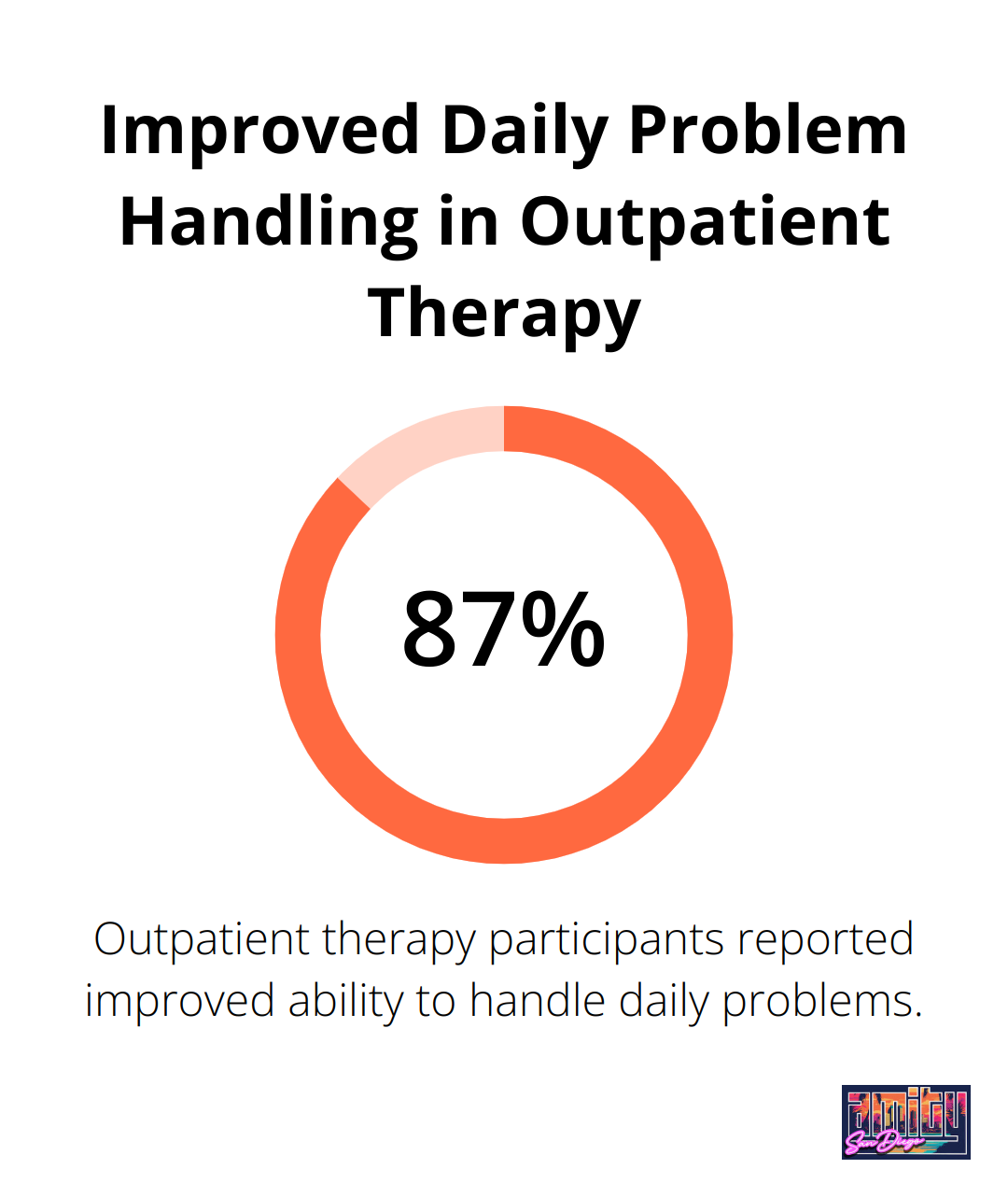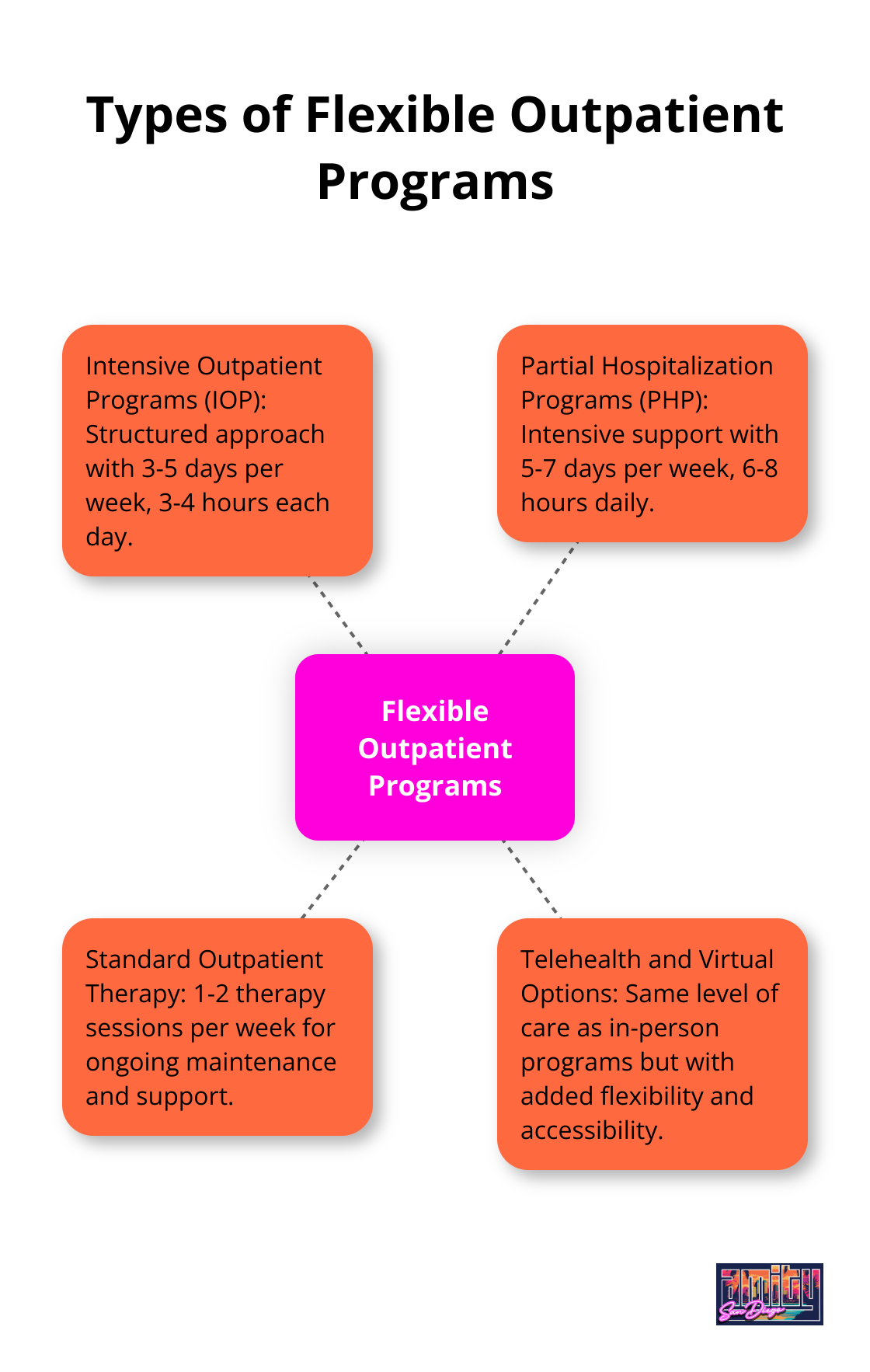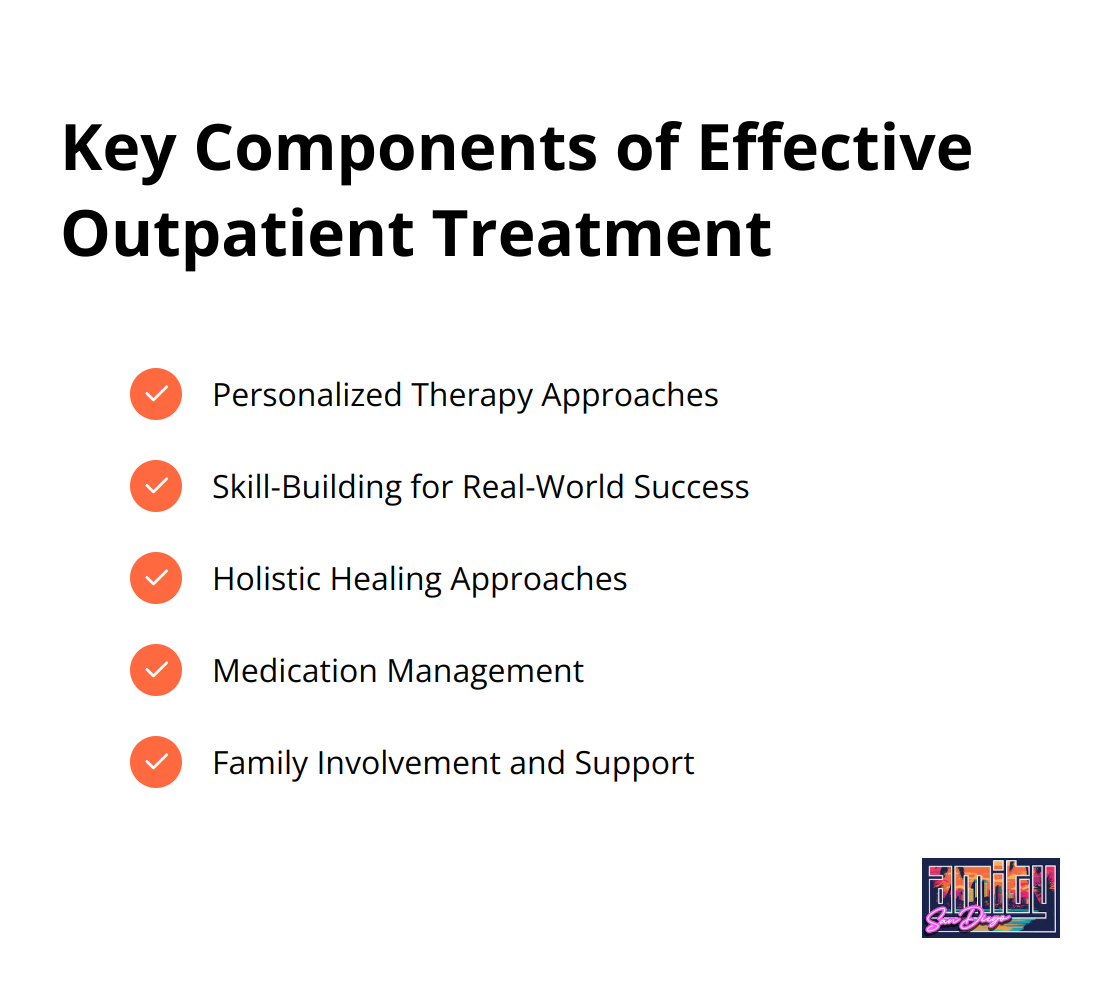At Amity San Diego, we understand the importance of continued care in recovery. Outpatient therapy offers a flexible solution for those looking to maintain their progress while balancing daily responsibilities.
This approach allows individuals to tailor their treatment plans to their unique needs and schedules, ensuring ongoing support without disrupting their lives.
Why Flexible Outpatient Therapy Works
Seamless Transition from Intensive Care
Flexible outpatient therapy revolutionizes the recovery process. It acts as a crucial bridge between intensive treatment and everyday life. This approach reduces the shock of transitioning back to normal routines. Studies have shown that outpatient programs tend to reduce the risk of relapse. At Amity San Diego, we witness the power of this gradual step-down approach in supporting long-term recovery.
Balancing Recovery and Responsibilities
The ability to maintain work, school, or family commitments stands out as a major advantage of flexible outpatient therapy. Clients can schedule sessions around their existing obligations, which makes recovery integration into daily life more manageable. This balance proves essential for long-term success. A study in the Journal of Substance Abuse Treatment found that employed individuals in outpatient treatment were 2.5 times more likely to complete the program successfully.
Personalized Treatment Plans
Recovery journeys differ for everyone. Flexible outpatient therapy allows for highly individualized treatment plans. We work closely with each client to create a schedule that fits their unique needs and goals. This might include a mix of individual counseling, group therapy, and holistic treatments (such as yoga or nutrition counseling). The ability to adjust treatment intensity ensures that clients receive the right level of care at the right time.
Real-World Application of Skills
Outpatient therapy provides immediate opportunities to apply new coping skills in real-life situations. This practical application proves invaluable for long-term recovery. Clients can discuss challenges as they arise with their therapist, receiving timely support and guidance. A survey by the Substance Abuse and Mental Health Services Administration (SAMHSA) showed that 87% of outpatient therapy participants reported improved ability to handle daily problems.

Continuous Support and Accountability
Flexible outpatient therapy offers ongoing support and accountability. Regular check-ins with therapists and peers help maintain motivation and focus on recovery goals. This consistent support system proves particularly beneficial during times of stress or temptation. The American Society of Addiction Medicine emphasizes the importance of this continued care in preventing relapse and supporting long-term recovery.
Flexible outpatient therapy combines ongoing support with real-world integration, making it a powerful tool in building a sustainable, fulfilling life in recovery. As we explore the different types of flexible care options, you’ll see how these benefits apply to various treatment intensities and structures.
Flexible Outpatient Programs: Tailored Care for Every Recovery Journey
At Amity San Diego, we offer a range of flexible outpatient programs to meet diverse recovery needs. These programs provide varying levels of support and structure, allowing individuals to receive appropriate care while maintaining their daily responsibilities.
Intensive Outpatient Programs (IOP)
IOPs offer a structured yet adaptable approach to recovery. Clients typically attend treatment 3-5 days per week for 3-4 hours each day. This program suits those who need more support than weekly therapy but don’t require 24/7 supervision.
Intensive Outpatient Programs are an important part of the continuum of care for alcohol and drug use disorders. They are as effective as inpatient treatment for most individuals. IOPs often include a mix of group therapy, individual counseling, and skill-building workshops.
Partial Hospitalization Programs (PHP)
PHPs offer a structured and supportive environment for those transitioning from inpatient care or seeking an alternative to residential treatment. Clients usually attend treatment 5-7 days per week for 6-8 hours daily. This program suits individuals stepping down from inpatient care or those needing intensive support without 24-hour supervision.
Targeted follow-up services received within 14 days postdischarge from an inpatient hospital stay or residential detoxification can be beneficial for patients in PHPs.
Standard Outpatient Therapy
This level of care typically involves 1-2 therapy sessions per week. It suits individuals with a stable living environment and strong support system who need ongoing maintenance and support in their recovery journey.
The National Institute on Drug Abuse reports that outpatient therapy can be as effective as residential treatment for many individuals (especially when combined with medication-assisted treatment when appropriate).
Telehealth and Virtual Options
Virtual outpatient programs have gained popularity, offering the same level of care as in-person programs but with added flexibility. A study in the Journal of Medical Internet Research found that telehealth addiction treatment had comparable outcomes to in-person care, with the added benefit of increased accessibility.
Many treatment centers (including Amity San Diego) have embraced telehealth options, allowing clients to access therapy, group sessions, and even some holistic treatments from the comfort of their homes. This has proven particularly beneficial for clients with transportation challenges or busy schedules.
Choosing the Right Program
Selecting the appropriate level of care is essential for successful recovery. A thorough assessment helps recommend the most suitable program for each individual’s needs and circumstances. The flexibility to adjust the level of care as a client progresses in their recovery journey remains a key advantage of outpatient programs.

As we explore the key components that make these flexible outpatient programs effective, you’ll gain a deeper understanding of how each element contributes to long-term recovery success.
What Makes Outpatient Treatment Effective?
At Amity San Diego, we’ve observed how the right components in outpatient treatment significantly impact recovery outcomes. Let’s explore the key elements that contribute to successful flexible outpatient care.

Personalized Therapy Approaches
Effective outpatient treatment begins with a tailored combination of individual and group therapy sessions. Individual therapy allows for deep, personalized work on specific issues, while group sessions provide peer support and shared learning experiences. The National Institute on Drug Abuse reports that a mix of both therapies leads to better outcomes than either approach alone.
In individual sessions, therapists use evidence-based techniques like Cognitive Behavioral Therapy (CBT) and Dialectical Behavior Therapy (DBT) to address the root causes of addiction and develop coping strategies. Group therapy often focuses on relapse prevention, communication skills, and building a sober support network. Medications such as disulfiram, acamprosate, and naltrexone are available for treating alcohol dependence, which commonly co-occurs with other drug addictions.
Skill-Building for Real-World Success
Outpatient programs that incorporate practical skill-building workshops see higher rates of long-term recovery success. These workshops equip clients with tools for daily life. Topics might include stress management, financial planning, job readiness, and healthy relationship building.
Vocational counseling is an important component of substance use disorder (SUD) treatment, as many individuals with SUDs have histories of challenges in managing alcohol/drug use issues and their jobs.
Holistic Healing Approaches
Integrating holistic therapies into outpatient treatment addresses the whole person, not just the addiction. Yoga and meditation have shown promising results in reducing stress and cravings.
Nutrition counseling is another vital component. The American Dietetic Association emphasizes the role of proper nutrition in recovery, noting that a balanced diet can help repair damage caused by substance abuse and improve overall well-being.
Medication Management
For some individuals, medication-assisted treatment (MAT) plays a critical role in recovery. Outpatient programs that offer MAT (under careful medical supervision) can help manage cravings, reduce withdrawal symptoms, and support long-term sobriety. MAT has been shown to improve patient survival rates, increase retention in SUD treatment and recovery services, and decrease illicit opiate use.
Family Involvement and Support
Effective outpatient programs often include family therapy and education components. These sessions help repair relationships, improve communication, and create a supportive home environment for recovery. Research shows that family involvement in treatment can significantly increase the chances of long-term sobriety (National Institute on Drug Abuse, 2020).
Final Thoughts
The journey to recovery continues beyond initial treatment. Outpatient therapy offers a powerful solution for those who want to maintain progress while managing daily life. This approach provides support without disrupting work, family, or personal commitments.
Outpatient therapy allows individuals to apply new skills in real-world situations. It tailors treatment plans to individual needs, ensuring the right level of care at the right time. Regular check-ins with therapists and peers help maintain motivation and focus on recovery goals.
We at Amity San Diego understand the importance of flexible, personalized care in recovery. Our outpatient programs combine evidence-based treatments with holistic approaches to address the whole person. If you seek addiction treatment in San Diego, explore our flexible outpatient options to reclaim your future.

